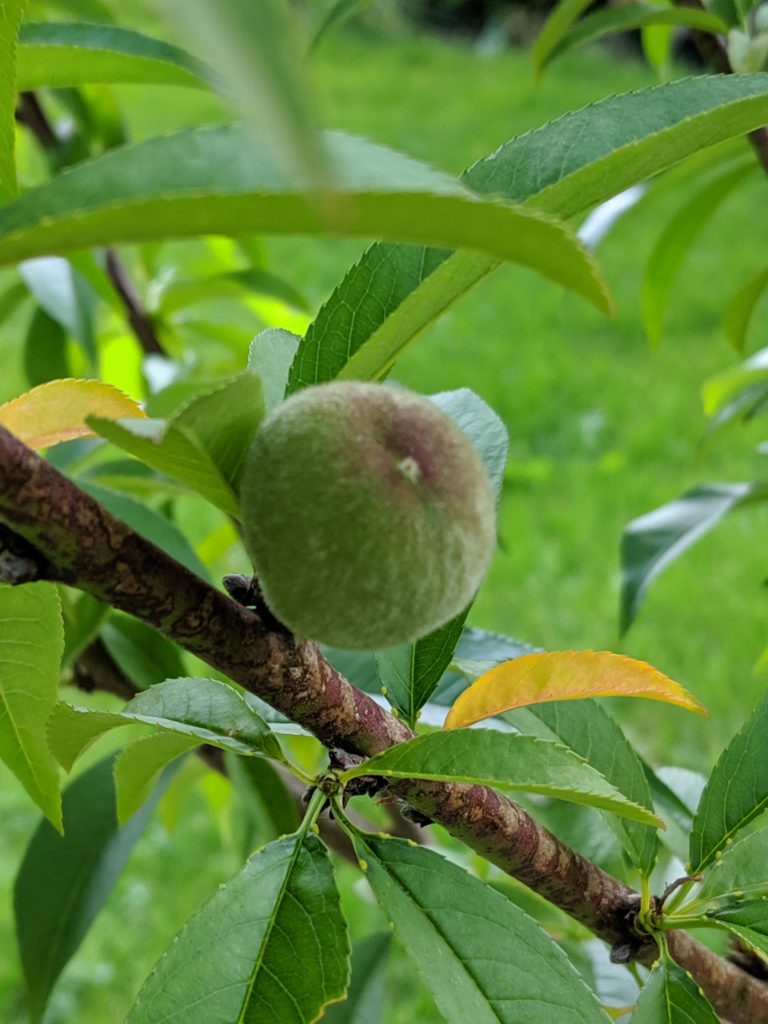
One of our hobbies (or mine, anyway; Z indulges me by constructing whatever I need and putting it in place, but the daily labor is mostly mine) is growing as much of our own food as possible on our little plot of land. We have more property than a typical house “in town”, but far less than what we (I) would like. Still, we do what we can with it, and I’m not going to prevaricate – I’m a little bit proud of what we can manage. Red raspberries, black raspberries, blueberries, beans, peas, garlic, strawberries, radishes, lettuce, potatoes, and grapes all grow in our backyard, along with one apple tree and a planned peach tree. The front yard currently hosts five trees
(three apple, two peach), with one more (peach) planned for the fall; my newest experiment is zucchini and rhubarb in the front flower beds. To be perfectly honest, my motivation isn’t so much to save money by growing our own edibles; it’s more that I simply enjoy it, and I want my girls to grow up knowing first-hand how things grow. One of the unexpected and very much unplanned side effects is a better understanding of Scripture.
The New Testament, particularly Jesus’ teaching it seems, is full of agricultural references and analogies. These were, I think, readily understood at least in some measure by the original readers/hearers, but in our post-industrial revolution, more and more people are growing up without the experience of planting something and waiting for it to grow. Our backyard garden in a small way fills in some of the gaps left by our non-agrarian culture, and reveals different things to us if we’re paying attention.
One of the verses that has come to mind as I go about the spring work of preparing beds and planting is Galatians 6:9: “And let us not grow weary of doing good, for in due season we will reap, if we do not give up.” Gardening keeps this in front of me day after day.
If I grow weary and give up on lugging water from the rain barrel to the garden box, there won’t be much of a harvest as my peas get scorched by the sun towards the end of June. If I grow weary and quit weeding, that lettuce will soon be overshadowed, the strawberries will rot, and the radishes will be invisible under the dandelion leaves. Steady dedication to the hard work of pruning, pulling, watering, fertilizing makes for the best harvest I can humanly bring about. Weeds grow in hearts as well as gardens; in much the same way, if I grow weary and quit communicating with my husband, or give up on training my children, or stop memorizing Scripture, or let the dedicated time for Bible reading and prayer slide, there really won’t be much of a spiritual harvest at any time.
The other principle it highlights is that of the due season. I just planted the last of the green beans today this morning; it won’t do me much good to go out tomorrow looking for sprouts or next week looking for beans. It’s not their season. The strawberries aren’t going to be ripe in early May, the peaches aren’t going to be ready in June, and the apple trees I put in a month ago aren’t going to bear this year. There’s nothing wrong with any of these things; it’s simply not their season yet. And the seeds of faith and love and kindness I planted in the hearts of my children yesterday and last week and last year aren’t going to blossom tomorrow either, but only when it’s their season.
I get it. Parenting small children (and big ones too) is exhausting and often discouraging. Being married to a sinner is occasionally not a picnic. Even being a reasonably decent friend often takes more effort than expected. But persevere; there will be a harvest if we don’t give up – in due season.
